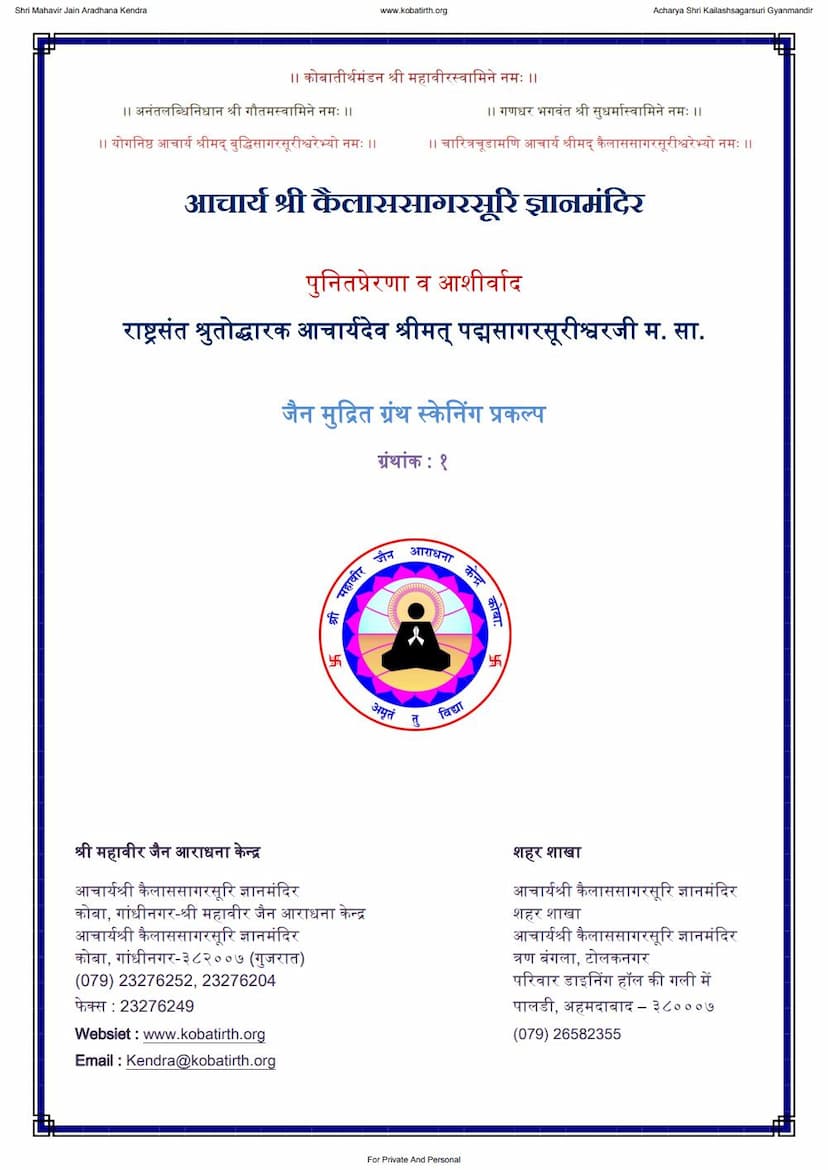Snatra Parshwanath Panchkalyanak Antray Nivaran Puja
Added to library: September 2, 2025

Summary
Here's a comprehensive summary of the Jain text "Snatra Parshwanath Panchkalyanak Antray Nivaran Puja" by Parshva Bhakti Mandal, based on the provided pages:
The text is a compilation of prayers and devotional songs, primarily focused on Lord Parshvanath, the twenty-third Jain Tirthankara. It is published by the Shri Mahavir Jain Aradhana Kendra and the Parshva Bhakti Mandal.
Key Aspects and Themes:
- Devotion to Lord Parshvanath: The central theme is the deep devotion and reverence for Lord Parshvanath. The book features various prayers and songs specifically dedicated to him, highlighting his divine qualities and auspicious events in his life.
- Panchkalyanak Puja: A significant portion of the text details the "Panchkalyanak Puja," which celebrates the five auspicious events in the life of a Tirthankara:
- Garbha Kalyanaka (Conception): Celebrates the conception of Lord Parshvanath in the womb of Queen Vama. It describes the auspicious dreams Queen Vama had and the divine celebrations by Indra and other deities.
- Janma Kalyanaka (Birth): Details the birth of Lord Parshvanath. It recounts the divine celebrations by the gods, the offerings made, and the auspiciousness that spread across the universe.
- Diksha Kalyanaka (Renunciation): Describes Lord Parshvanath's renunciation of worldly life and his ascetic practices. It emphasizes the importance of penance and detachment.
- Keval Gyan Kalyanaka (Omniscience): Celebrates the attainment of omniscience by Lord Parshvanath, marking him as a fully enlightened being.
- Nirvana Kalyanaka (Liberation): Commemorates Lord Parshvanath's liberation from the cycle of birth and death, achieving Moksha.
- Antaray Karma Nivaran Puja (Worship to Remove Obstacles): This section focuses on prayers and rituals aimed at removing obstacles and afflictions caused by "Antaray Karma" (obstruction karma). It emphasizes how devotion and specific worships can help overcome these hindrances in spiritual progress. The text details eight types of worship (Ashtaprakari Puja) for this purpose, each dedicated to a specific offering and its spiritual significance:
- Jal Puja (Water Worship): To purify oneself and remove obstacles related to past sins.
- Chandan Puja (Sandalwood Worship): To attain inner peace and overcome obstacles related to greed and attachment.
- Pushpa Puja (Flower Worship): To cultivate virtues and remove obstacles related to desires.
- Dhupa Puja (Incense Worship): To burn away karmic impurities and obstacles.
- Deepak Puja (Lamp Worship): To illuminate the soul and overcome obstacles related to ignorance.
- Akshata Puja (Rice Worship): To achieve unbroken spiritual progress and overcome obstacles to strength.
- Naivedya Puja (Food Offering Worship): To attain spiritual nourishment and overcome obstacles related to desires for worldly pleasures.
- Phala Puja (Fruit Worship): To attain the fruits of spiritual practice and overcome obstacles to liberation.
- Snatra Puja: This refers to a ritual bath performed for the deity. The text includes verses and descriptions related to the Snatra Puja, a significant ritual in Jainism, especially during festivals.
- Praise for Acharyas and Gurus: The book starts with salutations and dedications to prominent Jain Acharyas, including Acharya Shri Kailashsagarsuri and Acharya Shri Padmasagar Surishwarji Maharaj.
- Community and Spiritual Endeavor: The Parshva Bhakti Mandal is presented as an active group involved in religious activities, including conducting pujas, offering donations, and engaging in spiritual practices like Samayika and Pratikraman. They aim to spread devotion and support the Jain faith.
- Philosophical and Devotional Lyrics: The text is rich with devotional songs (bhajans and dohas) that express deep faith, aspiration for liberation, and reflection on the transient nature of life and the importance of spiritual pursuits. These lyrics often use metaphors and stories from Jain scriptures to convey their message.
- Focus on Virtues: The prayers and explanations highlight the importance of virtues like knowledge (gyan), conduct (charitra), faith (samkit), compassion (daya), and detachment (virag) for spiritual upliftment.
- Historical and Literary Context: The text mentions the lineage of scholars and monks, including Pandit Veer Vijayji Maharaj, who composed some of these devotional works. It also refers to specific events and legends associated with Jain Tirthankaras.
In essence, "Snatra Parshwanath Panchkalyanak Antray Nivaran Puja" is a comprehensive devotional manual for Jain followers, particularly those devoted to Lord Parshvanath. It serves as a guide for performing the significant Panchkalyanak and Antaray Karma Nivaran pujas, accompanied by spiritual hymns and philosophical insights to foster devotion and spiritual progress.